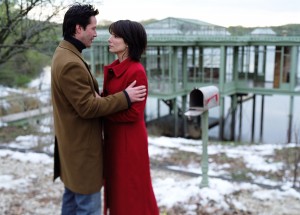The Lake House –

it's time we met
![]()
The Lake House – Alejandro Agresti
Disbelief is protective. Darwinian almost. A sort of emotionalised doubt. Doubt and disbelief are connected with our desire for evidence, truth. Challenging, testing things out so we get them right and are not misled or deceived. Thus protected. Suspending our disbelief therefore is a gesture of good will. A form of trust. We love stories. With passion. This deep-seated attraction lies at the heart of the appeal of narrative fiction. I guess the aesthetic quality of a film or book and the artistic skill of its creator, are measured by how well the writer or director builds on our good will and respects our trust in drawing us into his imagined world to persuade us to accept it. Believe in it. Some might say love itself is a willing suspension of disbelief. An instinct to trust.
The love story is one of the toughest genres in movies. If we do no believe in the characters and their relationship – there is no movie. A true love story is almost forensic towards its protagonists. These two people and how they feel about one another is the film. All kinds of character inconsistencies can be glossed over with exciting action, narrative pace and drive. It happens in most films. But in a love story like TLH, Keanu Reeves’ idealistic architect Alex Wyler and Sandra Bullock’s Dr Kate Foster testify before us to their love. The strength of TLH is that this critical aspect of the movie works for me. While no great fan, I am not Keanu-phobic as many critics are. I can buy into Reeves’ idealistic, boots-dirty architect. And the richer timbre age appears to be giving his voice adds a welcome variety of tone, an element of gravitas that helps. And I am susceptible to Sandra Bullock’s self-mocking, home-town-girl charm when in this quiet, understated mood. So Director Agresti has the critical ingredients right. The fascinating little time-fractured fantasy/mystery, taken from a 6 year-old Korean film (Siworae or Il Mare, Hyung Seung-Lee) within which he sets up Alex and Kate, loners both, to fall in love is both intriguing and evocative.
In 2006, with a yet-to-be-explained sadness, Dr Kate Foster leaves her beautiful, much loved, timber-framed, all glass house perched on stilts above a lake water’s edge. This beautiful, very private woman leaves her open, transparent house with her beloved dog, to take up an ER residency in the city. She leaves a note for the new owner in the hutch-on-a-post US mailbox, asking him to forward any mail. Cut to Alex’s arrival. Through perplexing inconsistencies in these two apparently sequential events, we begin to realise there is something out of whack here. Time. It emerges that Alex is in 2004, also for yet-to-be-explained reasons, moving in to the family home his famous architect father (Christopher Plummer) designed especially for Alex’s mother. Alex is re-opening the house, long empty after the acrimonious split up of the family.
The mailbox is the conduit between these different times, through which these strange facts emerge. Alex and Kate therefore, ‘meet’, get to know, and become attracted to each other by letter. Across it seems time as well as space. There is much romantic resonance in this neat little idea. Unattainability, elusiveness and that rarity in modern love stories, what we might call a sensibility of restraint. Paradoxically, through the device of time separation, Agresti is enabled to give his lovers ‘space’ to get to know each other, before as we might say, they ‘know’ each other. This gives the spice of added uncertainty to the central dramatic thread of all love stories – will they or won’t they be together?
With the poverty of imaginative aspiration in so many movies nowadays this is all very welcome. And it is a nice little movie. But Agresti never makes up his mind whether this is a mystery or a fantasy. The challenge of fantasy is to make it credible without explanation. The rule of mystery is: if you can’t explain – don’t try; if you decide to explain – convince. The Birds and Caché (Hidden) are great movies opting for the former and perhaps The Usual Suspects a good example of the latter. Unfortunately, in The Lake House Agresti hasn’t the courage to do the first or the rigour to achieve the second. So having gained our trust, he gradually dissipates it with a clunky, sometimes lazy, visual and narrative literalness and inconsistency that keeps tweaking our latent scepticism. This eventually leads him to an ending that I find deeply disappointing but may satisfy some. Indeed considering the sensibility to be found in the movie as a whole, I wonder whether Agresti’s ending was forced on him.
An undemanding, romantic date movie that could have been the haunting love story it at times aspires to be. And at moments almost becomes. The back-story of Alex’s relationship with his brother (an oddly cast Ebon Moss Bachrach) and estranged father, works well enough to add credibility to his character. And Bullock’s playing gives Kate a wistful sadness we hopelessly romantic brain-addled males find, exasperatingly to the women in our lives, absolutely irresistible.
I haven’t talked about the dog. I don’t do dogs. Suffice to say, the cutely named female dog, ‘Jack’, is another link between the time-crossed lovers. I’ve seen worse, much, but it doesn’t add anything for me. But then dogs in movies is a subject for another time. I fantasise about a disaster movie where the dog gets it, gruesomely, in the first 10 minutes. There are limits – even to my unreconstructed romanticism.
(July 2006)
Filed under: 3 star, Alejandro Agresti, Drama, General, Hollywood, Philosophical, Romance

